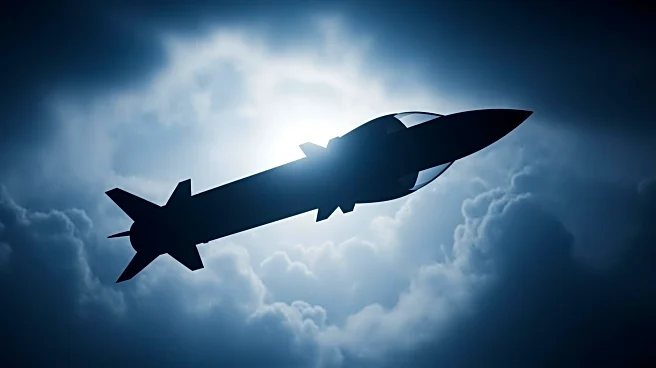What's Happening?
Russia has conducted a test of a nuclear-powered missile, which it claims cannot be intercepted by air defenses. This development comes as the United States and European countries increase pressure on President
Vladimir Putin to negotiate an end to the ongoing invasion of Ukraine. The missile, known as Burevestnik and code-named Skyfall by NATO, reportedly covered 14,000 kilometers in a test. Kremlin spokesperson Dmitry Peskov emphasized that Russia is focused on ensuring its security, particularly in response to perceived militaristic sentiments from European nations. President Trump has criticized the missile test, urging Putin to prioritize peace negotiations over military advancements.
Why It's Important?
The missile test underscores Russia's commitment to bolstering its defense capabilities amid international pressure to resolve the conflict in Ukraine. The test could escalate tensions between Russia and Western nations, complicating diplomatic efforts to end the war. The introduction of advanced missile technology may shift the balance of power in the region, potentially prompting NATO and other countries to reassess their defense strategies. The situation also highlights the challenges faced by President Trump in navigating foreign policy and maintaining international stability.
What's Next?
As the conflict continues, Russia and Ukraine are likely to seek additional support from allies. Ukraine has already secured military aid from France and the United Kingdom, including fighter jets and missiles. Meanwhile, Russia is engaging with North Korea, which has provided military support for its invasion. The international community may respond with further sanctions or diplomatic measures to pressure Russia into negotiations. The ongoing military developments could lead to increased instability in the region, affecting global security dynamics.
Beyond the Headlines
The missile test raises ethical and legal questions about the proliferation of nuclear technology and its implications for global security. The advancement of missile capabilities may trigger an arms race, with countries investing in similar technologies to counter potential threats. This development could also impact international arms control agreements and efforts to prevent the spread of nuclear weapons.










